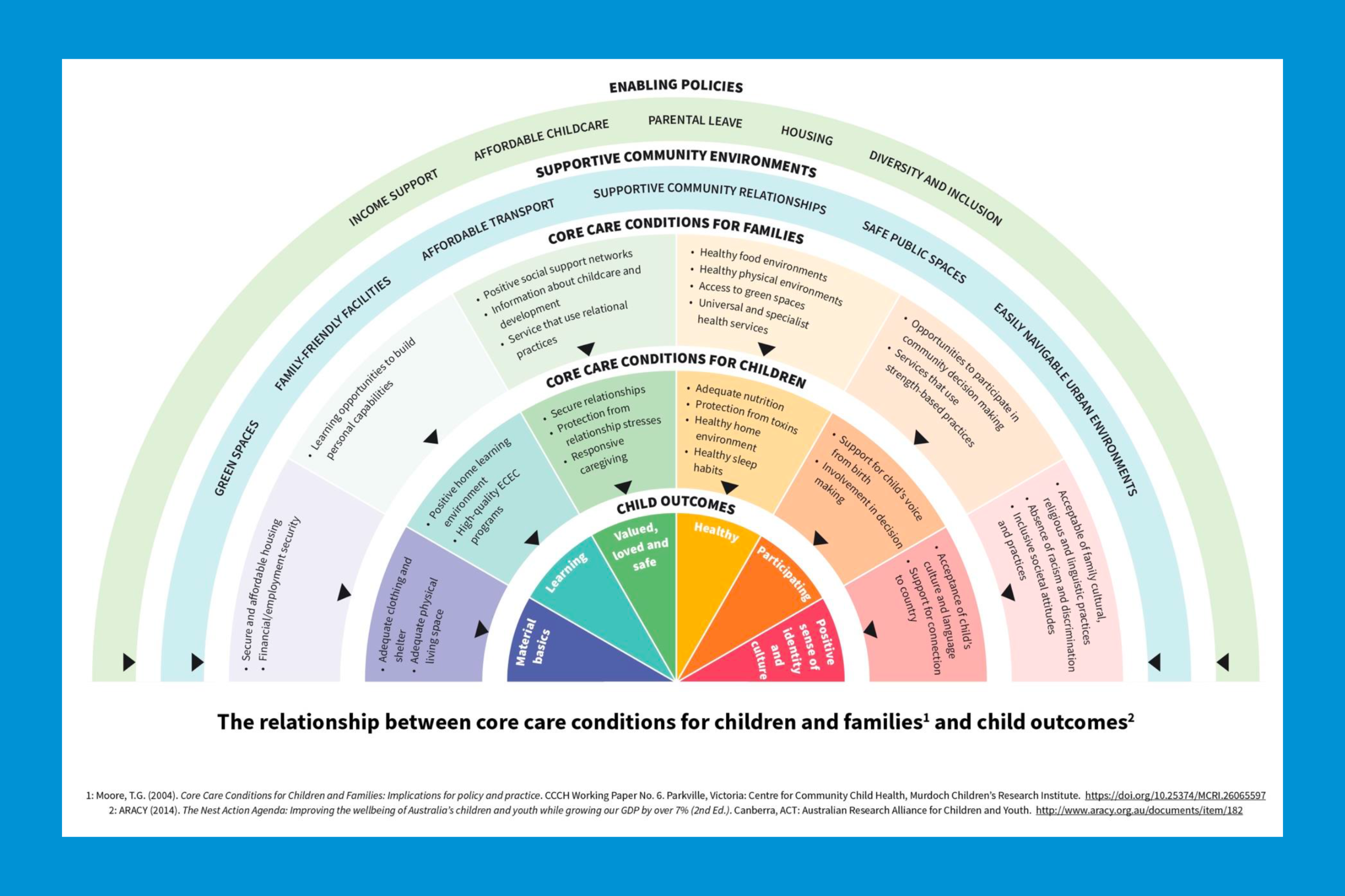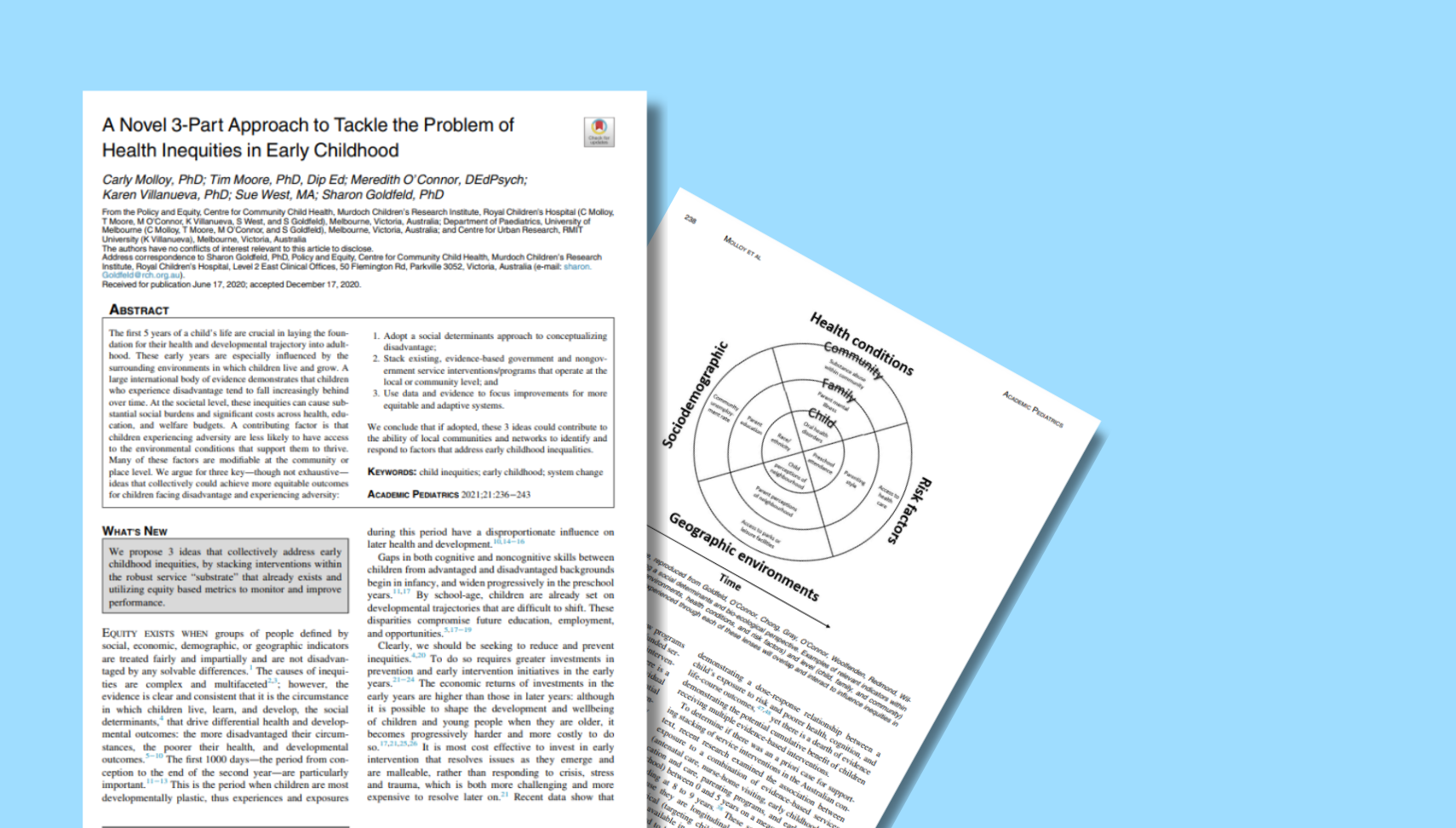Supporting children and families through place-based approaches
Place should be defined locally with children and family at the core.
The early years provide a critical foundation for lifelong health, development and wellbeing. The conditions in the places where children live, play and learn shape how children develop. However, the conditions that support children and families to thrive are not equally distributed.
Place-based approaches are a promising strategy to address complex challenges in local communities, improve early childhood outcomes and reduce inequities.
By bringing together families, communities, service providers, government and philanthropy to develop a shared understanding of community needs, local solutions can be established.
Take a look at the research, tools and practice resources below to support those working in and with place-based initiatives with data utilisation, community-led change and solutions to address early years system challenges.
Key early years resources to support local strategy development:
Core care conditions for children and families: Implications for policy and practice (2024)
This report describes the key features of the social and physical environment that young children and their families need to flourish.


A novel 3-part approach to tackle the problem of health inequities in early childhood (2021)
A review of the evidence for early childhood inequalities that proposes three key ideas for achieving more equitable outcomes for children.

Using data for shared understanding, action and impact
Foundational community factors for early childhood development
The Kids in Communities Study (KiCS) worked to understand how different factors in our communities have the greatest influence on developmental outcomes across communities.
2021
This paper presents overall findings from an Australian mixed methods investigation into community-level effects on early childhood development.
2019
This paper (not open access) discusses the need for rigorous evidence that identifies community factors, and potential actions, that influence early childhood development.
2018
The final report from KiCS details the factors that lay the foundations of a good community for young children.
2019
This paper describes the pathways through which aspects of housing are related to early childhood development using data from disadvantaged local communities.
Early childhood service indicators for improving access and effectiveness
Restacking the Odds (RSTO) supports communities and service providers to use data to understand if children and families can and do access high-quality, evidence-informed services where and when they need them.
The RSTO Indicator Guide provides evidence-based lead indicators to measure quality, quantity and participation for five key early childhood services: antenatal care, nurse home visiting, early childhood education and care and early years of school.
The RSTO resource hub collates learning and evidence on strategies to address inequities in health outcomes many children and families face, with a focus on improving service quality, quantity, and participation.
2024
This paper presents the findings from research investigating barriers and enablers to collecting, reporting, and using data and evidence-based lead indicators in decision-making.
2024
This research snapshot details a case study from a partnership between Restacking the Odds and Logan Together.

Building workforce skills and capabilities for community-led change
Enhancing access and connection through early years system integration
National Child and Family Hubs Network
The National Child and Family Hubs Network is dedicated to strengthening Child and Family Hubs to ensure children and families can access the supports and services they need.
2024
This webinar discusses service integration, tips for establishing Child and Family Hubs, and how to meaningfully co-design with communities.
2024
This paper examined NSW policy stakeholder and health service manager perspectives on the barriers and enablers to translating policy into practice in the implementation of Child and Family Hubs.
2024
This webinar discusses the application of research in Child and Family Hubs, and explores how Hubs help to reduce inequity in communities.
2023
This webinar explored the critical role of Hubs in connecting families to services and social supports.
2022
This paper is a study protocol for the co-design, testing and evaluation of integrated Hub models of care in two Australian community health services.
Healthier Wealthier Families
Healthier Wealthier Families connects primary healthcare with financial counselling, with the goals of increasing household income, decreasing financial hardship, and improving parents’ mental health.
2023
This snapshot details the background, development and pilot testing of the HWF model.
Integrated child and family services
2021
This paper reviews what is known about the core needs of children and families, the conditions that parents need to be able to meet the needs of their children, how well the service system is meeting those needs and the role integrated child and family centres play.
2021
This paper reviews national and international examples of holistic, integrated early learning programs for young children and their families experiencing socio-economic vulnerability, and the extent to which integrated child and family centres can meet these core care needs.
The importance of the neighbourhood built environment
2024
This paper examines whether urbanicity was associated with children’s developmental vulnerability.
2024
This literature review highlights neighbourhood built environment features that were important for children’s health and wellbeing during the pandemic and sets a future urban policy research agenda.
2024
This paper investigated the relationship between geographic availability and quality of early childhood education and care services and children’s early mental health outcomes.
2023
This paper describes a spatial indicators' framework, that, once tested, can be used to assess and monitor urban neighbourhoods for their ability to equitably support early childhood development.
2022
This paper highlights the potential of improving access to neighbourhood public open spaces for preventing mental health difficulties and promoting competence in early childhood.
2022
This paper (not open access) explores the neighbourhood built environment features related to better early childhood development outcomes in disadvantaged communities.
2021
This conference abstract summarises the evidence for the neighbourhood built environment promoting children’s mental health.
2021
This conference abstract details associations between neighbourhood disadvantage and children’s mental health, looking at both positive mental health and mental health difficulties.
2019
This review summarises the evidence for how features of the neighbourhood built environment promote optimal mental health in childhood.
2016
This paper (not open access) argues for the importance of exploring the effect of the neighbourhood built environment on child development as a crucial first step toward informing urban design principles.
2014
This viewpoint argues for the importance of measuring neighbourhood features using geographic information systems (GIS), and linking and applying these measures to child health and development data.
Policy development to support place-based approaches
Policy briefs
2018
This policy brief describes seven principles needed for effective place-based collective impact.
2011
This policy brief explains why a place-based approach is important for engaging and connected families and communities.
Policy submissions
2023
This policy submission responds to the Department of Social Services Issues Paper.
Reports, papers and media
2024
This report describes the key features of the social and physical environment that young children and their families need to flourish.
2024
This literature review highlights neighbourhood built environment features that were important for children’s health and wellbeing during the pandemic and sets a future urban policy research agenda.
2022
- Part 1: A review of the literature
- A meta-synthesis of existing literature on place-based approaches.
- Part 2: A review of practice
- An examination of selected case studies across Victoria.
2021
This paper reviews the evidence for early childhood inequalities and proposes three key ideas for achieving more equitable outcomes for children.
2017
This report discusses the need to invest in place-based approaches to improve outcomes for children in disadvantaged locations.
2015
This report, from an invited presentation, highlights the key features of effective service delivery, and describes a universal human services framework.
2014
- The evidence: What we know about place-based approaches to support children's wellbeing
- This report summarises the evidence on what we know and are still yet to learn about place-based approaches to improving children’s outcomes.
- A snapshot of place-based activity promoting children’s wellbeing
- This report provides a snapshot of who is driving, doing and supporting place-based approaches to improve children’s outcomes.
- Big thinking on place: Getting place-based approaches moving
- This report provides a summary of the needs of policy makers, funding bodies, academics and practitioners in designing, delivering and researching approaches to support children and families in ‘place’.
- The state of play in Australian place-based activity for children
- This report provides recommended action to accelerate place-based efforts to improve children’s wellbeing and address inequalities in Australia.
2012
- Place-based initiatives transforming communities
- This first of two roundtable reports clarifies the challenges for the place-based agenda and extends existing approaches to address the complex issues faced by families.
- Place-based reform: Shaping change
- In this second roundtable report, consideration was given to some of the complexities of developing and delivering models of change in a place-based context.
2011
This review synthesises the conceptual and empirical literature on place-based approaches to meeting the needs of young children and their families.
2011
This media article from Croakey Health Media details the 2011 policy brief on place-based approaches to supporting children and families.
In October 2024, a new national centre for place-based work in local communities across Australia was announced. Partnerships for Local Action and Community Empowerment (PLACE) is a joint initiative of the Australian Government, the Minderoo Foundation, the Paul Ramsay Foundation, the Bryan Foundation, Dusseldorp Forum, and the Ian Potter Foundation.
Subscribe to our newsletter to discover the latest in place-based resources.
